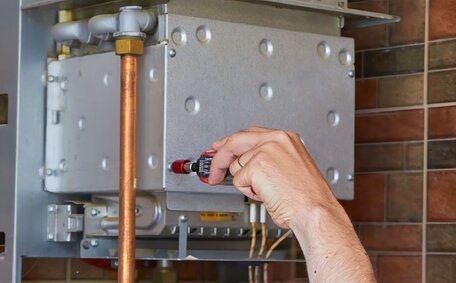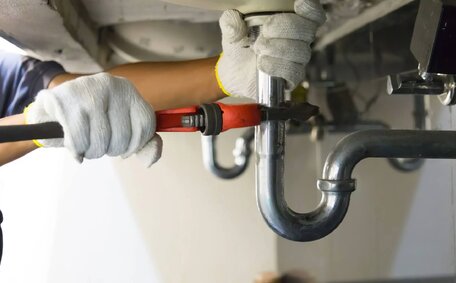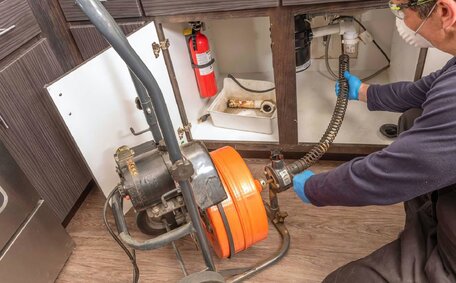Introduction to Landlord Gas Safety Obligations
As a rental provider, you have crucial legal responsibilities to ensure gas safety. Regular checks for compliance at your rental property safeguard tenants against risks associated with faulty gas installations, appliances, and pipework.
Your duties are critical; you must ensure annual gas safety checks cover all gas fittings and appliances. This includes gas boilers, cookers, fires and heaters. A registered gas engineer must conduct the checks and issue a landlord gas safety record as evidence of compliance.
Non-compliance with gas safety obligations could expose landlords to penalties up to $20,000, and more gravely, risk injury or fatal incidents from gas hazards. As such, non-compliance with all your gas safety should not be taken lightly.
This guide details your essential responsibilities regarding gas safety as a landlord. We’ll cover the regulations, inspection frequencies, using qualified professionals and more.
Key Regulations and Standards for Gas Installations
There are several key regulations that landlords must follow when it comes to gas installations in rental properties:
- The Gas Safety (Tenancies Act) 1997 requires that all gas appliances, pipework and flues are maintained in safe condition and checked for gas safety every 12 months by a licenced gas fitter. Landlord must keep records of these checks.
- All gas installations and fittings must comply with the AS/NZS 5601 Gas Installations standards. This covers areas like ventilation, location of appliances, pipe sizing, and electrical safety.
- Legal obligations compel landlords to provide tenants with a gas safety Compliance Certificate within 28 days post-inspection. This is also known as a Landlord Gas Safety Record (LGSR).
- Properties must be equipped with a carbon monoxide alarm wherever gas appliances are present, with an emphasis on sleeping quarters. Multiple alarms may be needed for full coverage, especially in the living area where tenants spend the most time.
Failure to comply with gas safety obligations can lead to fines up to $20,000, notably if properties are rented without meeting regulations. As a landlord, you have a duty of care to ensure checks can ensure gas safety and that your rental property complies with all regulations and standards. This is not only to avoid penalties, but more importantly for the safety of your property tenants.
Hiring qualified gas professionals, such as licensed gas fitters, is vital for responsible installation, maintenance, and inspection of all gas fixtures, as per consumer protection laws. Attempting DIY fixes on bottled gas systems is illegal and can lead to dangerous situations, potentially letting out gas unexpectedly or causing any other issues. Likely, choosing someone unqualified who offers low-cost services can compromise the energy efficient functioning of any type appliance and their compliance with gas safety regulations.
Don’t cut corners when it comes tenant gas safety. Stay compliant and help avoid the risks of fires, leaks, explosions and poisoning from faulty gas systems.
Qualification Requirements for Gas Fitters
Gas fitters must meet stringent qualification criteria to legally carry out checks, installations, and repairs involving gas electricity in Australia:
- These professionals must be safe registered, registered licensed, and endorsed by the Plumbers and Gas Fitters Board in the relevant state or territory where they operate.
- A gas fitting licence requires at least 4 years of training as an apprentice under a qualified supervisor.
- Gas fitters must undertake ongoing professional development courses to ensure their skills in gas, electricity, and safety meet minimum standards.
- Their technical knowledge must be comprehensive, covering electricity gas installations and meeting Australian Standard AS/NZS 5601.
- To ensure gas safety check compliance, licensed gas professionals must carry a certification card with a unique licence number issued by the regulatory board. It’s crucial that landlords verify this professional identification.
Providers must ensure that solely qualified professionals, licensed and with a robust grasp of health and safety, fulfil all legal criteria for comprehensive safety inspections and related tasks.
Engaging unqualified personnel for gasfitting tasks endangers tenants with threats of fires, gas leaks, explosions, and carbon monoxide exposure.
Frequency of Safety Inspections and Servicing
As a landlord, you’re obligated by law to ensure gas safety inspections of all appliances and installations in your rentals every 2 years. This must be carried out by a licenced gas fitter.
The inspection must highlight the safe operation of appliances, focusing on aspects like:
- Verifying all gas appliances are operational and properly maintained
- Inspecting gas line pipework and flue systems for damage or deterioration
- Conducting carbon monoxide testing on gas appliances for leaks
- Ensuring appliances are safe and have adequate ventilation for use
Once any gas safety check is complete, tenants who use gas appliances must receive a copy related to cold water safety Compliance Certificate (also called a Landlord Gas Safety Record) within 28 days. You should also keep a copy for your own records.
It’s prudent to schedule annual reminders for inspections and safety assessments before their 2-year due dates.
While major gas servicing is biennial, landlords should maintain year-round vigilance. As a diligent property manager, encourage tenants to report any potential gas safety issues like strange smells or appliance faults immediately to a gas safe engineer.
Obtaining Compliance Certificates and Records
Annual compliance certificates for all gas appliances, pipework, and flues in rental properties are a legal mandate for landlords. These certificates must be kept for at least two years and are also referred to as Landlord Gas Safety Records (LGSR).
A licensed gas fitter must carry out the inspection all gas safety checks and servicing. They will inspect all gas installations and appliances, confirm they are in good working order, and perform any necessary repairs or replacements.
Following an inspection, the gas fitter will issue a 12-month Gas Safety Compliance Certificate. This documentation for rented premises should include:
- The trader’s licence number and expiry date
- The specific gas appliances tested, their locations, detailed condition report including any defects identified, and the work undertaken
- The inspection date
- The certificate’s date of issue and expiry
Annual acquisition of this certificate and retention of copies for two years are essential to maintain compliance. Your tenants must receive a copy within 28 days of the gas safety check being conducted. Maintain precise administrative records.
If you ever need to demonstrate gas safety compliance to regulators, these Gas Safety Certificates will be critical proof. Fines apply for non-compliance.
By diligently managing inspection schedules and certification, rental providers must ensure ongoing gas safety for tenants, while meeting legal duties.
Consequences of Non-Compliance
As a landlord, failing to meet your gas safety obligations can have serious consequences including:
- Being issued with a gas safety defect notice requiring an urgent repair within strict deadlines. A failure to comply continuously may lead to disconnection of the gas supply entirely.
- Individuals must provide payment for infringement notices up to $3,300 and body corporates up to $16,500 in the event of a failure to comply.
- Court-imposed maximum penalties can reach $20,000 for not performing annual gas safety checks and maintaining records.
- Landlords may be unable to lawfully issue a section 21 repossession notice without an updated LGSR, as it is part of standard lease agreements.
Most concerning is jeopardising the safety of those in your home, which could precipitate the end tenancy or legal implications from a potential gas leak. Faulty gas appliances can lead to gas leaks, fires, explosions and carbon monoxide poisoning. As a landlord you have a legal and ethical obligation to mitigate these risks.
There can also be insurance implications if non-compliant or unserviced gas installations contribute to property damage or liability claims.
Take gas safety seriously by scheduling annual inspections with qualified experts and keeping comprehensive records. As a landlord, this is a statutory duty, and neglect could lead to dire consequences.
Tenant Education and Reporting Issues
It is important as a landlord to educate your tenants on gas safety and make sure they know how to identify and report any issues. Here are some tips:
- Equip new rental tenants with information regarding the gas appliances in the main living areas of the property, ensuring appliances’ safe use, along with awareness of signs like unusual odours that could signal leaks.
- Ensure tenants have your contact details to promptly report any potential gas safety issues, such as malfunctioning appliances or gas odours.
- Request that tenants let you know as soon as possible if pilot lights go out, appliances are damaged, or pipe connections come loose.
- Instruct tenants to avoid attempting repairs on gas appliances, and to report issues so you can organize a licensed professional’s inspection.
- Remind tenants to keep appliance vents clear and never cover air gaps on heaters that could lead to dangerous carbon monoxide buildup.
Tenant education is crucial for early recognition and reporting of gas issues, preventing escalation and ensuring compliance with the tenancy agreement. By maintaining open communication channels, you foster greater compliance and safety.
Ensure your lease agreements encompass tenant responsibilities for gas safety awareness and issue reporting, particularly in main living areas. Outline their responsibility to inform you of any potential problems immediately.
Landlord Checklists and FAQs
As a landlord, here are some key gas safety compliance checks you should follow:
- Arrange to service all gas appliances and conduct an annual gas safety check on all pipework by a licenced gas fitter
- Obtain a copy of the gas safety check record, known as the Gas Safety Compliance Certificate, from the gas fitter within 28 days and maintain these records for at least 2 years
- Provide a copy of the gas safety certificate to your tenants within 28 days of the check
- Check carbon monoxide detectors are installed in rooms with gas appliances and are in working order
- Educate tenants on signs of gas faults and ensure they have your contact details to report issues quickly
- Keep records demonstrating compliance with gas safety laws in the event regulators request them
Here are some common gas safety questions from landlords:
Who can conduct the gas safety check?
Determining who can do landlord gas safety inspections, installations, maintenance, and repairs is clear under residential tenancy regulations: only a licenced gas fitter is legally permitted.
What gas appliances need checking?
All fixtures related to hot cold water systems and fixed and portable gas appliances in rental properties, including gas heaters, ovens, hobs, water tanks, fall under the requirement for annual gas safety checks.
How often do checks need to occur?
Gas safety inspections must be conducted once every year, no more than 12 months apart, with new certificates issued each time.
What records do I need to keep?
Keep copies of the Gas Safe Certificates, as youll need them for at least 2 years for your records. Youll also need documentation showing you provided copies to tenants.
Adhering to this gas safety checklist diligently is essential for compliance and the safety of your tenants.






